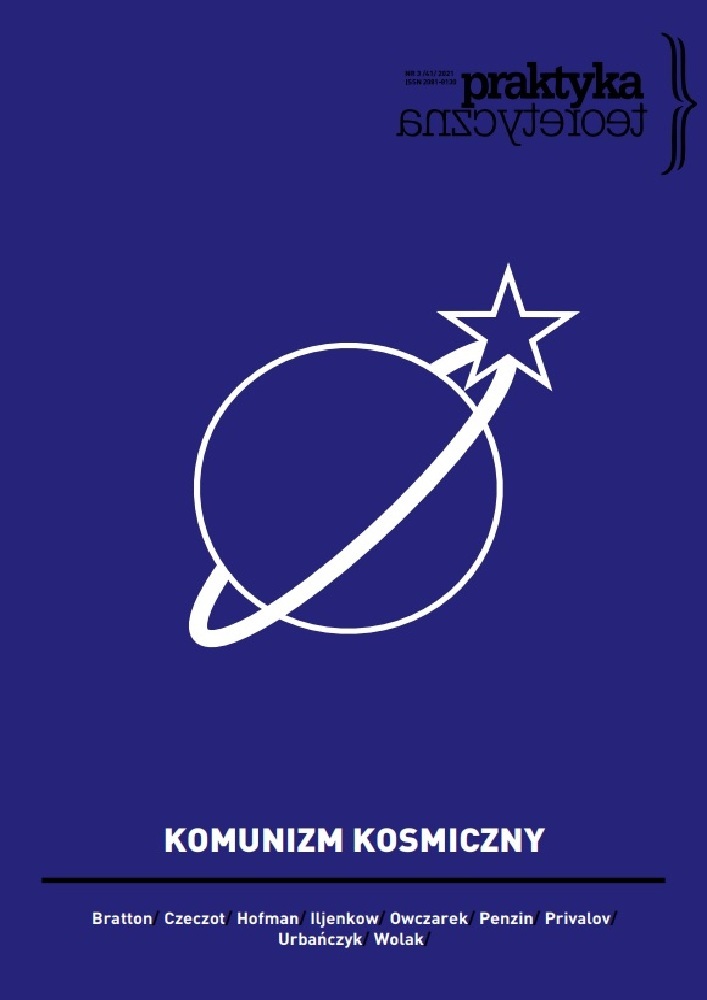Abstract
The presented text is a commentary on a Polish translation of Benjamin Bratton’s On anthropolysis. I introduce Benjamin Bratton, a Californian design theorist attempting to create a new model of political geography, to the Polish public. I delve mostly into Bratton’s The Stack: On Software and Sovereignty (2016) and critically discuss the content of this book, particularly the author’s notion of The Stack, with which he aims to revolutionize how power and sovereignty are conceived. I identify Bratton’s position in the newest intellectual history and discuss his most important theoretical inspirations. Finally, I comment on his notion of anthropolysis, in which I see a potential to solve some serious theoretical difficulties which result from The Stack.
References
Barbrook, Richard, and Andy Cameron. 1996. “The Californian Ideology.” Science as Culture 6(1): 44–72.
Bergson, Henri. 2007. Dwa źródła moralności i religii. Tłum. Piotr Kostyło i Krzysztof Skorulski. Kraków: Homini.
Bergson, Henri. 1988. Pamięć i życie. Tłum. Anita Szczepańska. Warszawa: Pax.
Bińczyk, Ewa. 2018. Epoka człowieka. Retoryka i marazm antropocenu. Warszawa: PWN.
Bratton, Benjamin H. 2015. Dispute Plan to Prevent Future Luxury Constitution. Berlin: Sternberg Press.
Bratton, Benjamin H. 2016. The Stack: On Software and Sovereignty. Cambridge–London: MIT Press.
Bratton, Benjamin H. 2021. “O antropolizie.” Tłum. Jakub Wolak. Praktyka Teoretyczna 41(3): 159–168. https://doi.org/10.14746/prt.2021.3.8.
CCRU. 2015. Writings 1997–2003. Falmouth: Urbanomic.
de Chardin, Teilhard. 1987. Moja wizja świata i inne pisma. Tłum. Mieczysław Tazbir. Warszawa: Pax.
Fiodorow, Nikołaj. 2012. Filozofia wspólnego czynu. Tłum. Cezary Wodziński i Michał Milczarek. Kęty: Wydawnictwo Marek Derewiecki.
Gane, Nicholas, and Stephen Sale. 2007. “Interview with Friedrich Kittler and Mark Hansen.” Theory, Culture and Society 24: 323–329.
Halteman, Matthew C. 2015. “Ontotheology.” W Routledge Encyclopedia of Philosophy, accessed September 7, 2021, https://philarchive.org/archive/HALO-3v1.
Hadot, Pierre. 2003. Filozofia jako ćwiczenie duchowe. Tłum. Piotr Domański. Warszawa: Aletheia.
Hadot, Pierre. 2018. Czym jest filozofia starożytna? Tłum. Piotr Domański. Warszawa: Aletheia.
Heidegger, Martin. 1999a. „Platona nauka o prawdzie.” Tłum. Seweryn Blandzi. W Znaki drogi. Warszawa: Aletheia.
Heidegger, Martin. 1999b. „List o ‘humanizmie.’” Tłum. Józef Tischner. W Znaki drogi. Warszawa: Aletheia.
Heidegger, Martin. 1999c. „Czym jest metafizyka? Wprowadzenie.” Tłum. Krzysztof Wolicki. W Znaki drogi. Warszawa: Aletheia.
Hildebrand, Dietrich. 2012. Koń trojański w mieście Boga. Tłum. Jerzy Wocial. Warszawa: Fronda PL.
Hoły-Łuczaj, Magdalena. 2018. Radykalny nonantropocentryzm: Martin Heidegger i ekologia głęboka. Warszawa–Rzeszów: Wydawnictwa Uniwersytetu Warszawskiego – Wyższa Szkoła Informatyki i Zarządzania.
Joler, Vladan, i Matteo Pasquinelli. 2021. Nooskop ujawniony – manifest. Sztuczna inteligencja jako narzędzie ekstraktywizmu wiedzy. Tłum. Kuba Kulesza, Cezary Stępkowski i Agnieszka Zgud. Dostęp 4 grudnia 2021, https://nooskop.mvu.pl/.
Kissinger, Henry. 2016. Porządek światowy. Tłum. Maciej Antosiewicz. Wołowiec: Czarne.
Krämer, Hans. 2015. „Niepisana nauka Platona.” Tłum. Światosław Florian Nowicki. Peitho. Examina Antiqua 1(6).
Land, Nick. 2013. Fanged Noumena: Collected Writings 1987–2007. Falmouth – New York: Urbanomic – Sequence Press.
Mackay, Robin, and Armen Avanessian. 2014. #Accelerate#: The Accelerationist Reader. Falmouth: Urbanomic.
Milczarek, Michał. 2013. Z martwych was wskrzesimy. Filozofia Nikołaja Fiodorowa. Kraków: Wydawnictwo Uniwersytetu Jagiellońskiego.
Negarestani, Reza. 2008. Cyclonopedia: Complicity with Anonymous Materials. Melbourne: re:press.
Pomorski, Adam. 1996. Duchowy proletariusz: przyczynek do dziejów lamarkizmu społecznego i rosyjskiego kosmizmu XIX-XX wieku (na marginesie antyutopii Andrieja Płatonowa). Warszawa: Wydawnictwo Naukowe i Literackie Open.
Ratajczak, Mikołaj. 2015. „Wprowadzenie do teorii kapitalizmu kognitywnego: kapitalizm kognitywny jako reżim akumulacji.” Praktyka Teoretyczna 1(15): 57–94. https://doi.org/10.14746/prt.2015.1.2.
Rosińska, Monika. 2020. Utopie dizajnu. Pomiędzy afirmacją a krytyką nowoczesności. Kraków: TAiWPN Universitas.
Scannell, R. Joshua. 2018. Architectures of Managerial Triumphalism (Review of Benjamin Bratton, The Stack: On Software and Sovereignty). https://www.boundary2.org/2018/11/r-joshua-scannell-architectures-of-managerial-triumphalism-review-of-benjamin-bratton-the-stack-on-software-and-sovereignty/.
Schefer, Christina. 2001. Platons unsagbare Erfahrung. Ein anderer Zugang zu Platon. Basel: Schwabe.
Schmitt, Carl. 2019. Nomos ziemi w prawie międzynarodowym ius publicum Europaeum. Tłum. Kinga Wudarska. Warszawa: Fundacja Augusta hr. Cieszkowskiego.
Srnicek, Nick. 2017. Platform Capitalism. Cambridge: Polity Press.
Sitnicki, Ignacy. 2018. Metafilozofia kosmizmu i transhumanizmu. Warszawa: Semper.
Terranova, Tiziana. 2014. “Red Stack Attack! Algorithms, Capital and the Automation of the Common” W #Accelerate#: The Accelerationist Reader, red. R. Mackay and A. Avanessian, 379–400. Falmouth: Urbanomic.
Terranova, Tiziana. 2020. Atak czerwonego stosu. Algorytmy, kapitał i automatyzacja tego, co wspólne. Tłum. Maszynowe gromady w zintegrowanym globalnym kapitalizmie. http://www.maszynowegromady.pl/terranova.html.
Teschke, Benno. 2009. The Myth of 1648: Class, Geopolitics, and the Making of Modern International Relations. London: Verso.
Wark, MacKenzie. 2015. Molecular Red: Theory for the Anthropocene. London: Verso.
Williams, Alex, and Nick Srnicek. 2014. “#Accelerate: Manifesto for an Accelerationist Politics.” W #Accelerate#: The Accelerationist Reader, red. R. Mackay and A. Avanessian, 347–362. Falmouth: Urbanomic.
Williams, Alex, and Nick Srnicek. 2016. „#PRZYSPIESZ Manifest akceleracjonistycznej polityki.” Tłum. Piotr Płucienniczak. W Rozdzielczość Chleba. Nośnik #4: ZUS: 46–53. https://rozdzielchleb.pl/przyspiesz-manifest-akceleracjonistycznej-polityki/.
Zenil, Hector, red. 2012. A Computable Universe: Understanding and Exploring Nature as Computation. New Jersey – London – Singapore – Beijing – Shanghai – Hong Kong – Taipei – Chennai: World Scientific.
Zygmuntowski, Jan. 2020. Kapitalizm sieci. Warszawa: Rozruch.
License
“Theoretical Practice” seeks to put into practice the idea of open access to knowledge and broadening the domain of the commons. It serves the development of science, thinking and critical reflection. The journal is published in open-access mode under the CC-BY-NC-SA 4.0 license (detail available here: http://creativecommons.org/licenses/by-nc-sa/4.0/). Articles published in the journal may be freely distributed, stored, printed and utilized for academic and teaching purposes without restrictions.
They should not be, however, used for any commercial purposes or be reconstructed into derivative creations. Access to the journal may not be limited or offered for a fee by any third party.
Prospective authors are obliged to fill in, sign and send back the publishing contract compliant with the CC licencing. [PL.pdf, PL.doc, EN.pdf,EN.doc].
According to this contract, authors grant the journal a non-exclusive right to publish their work under the creative commons license (CC-BY-NC-SA 4.0) without any financial obligation on both sides of the contract.
Before submission authors should make sure that derivative materials they use are not protected by copyright preventing their non-commercial publication. Authors are responsible for any respective copyright violations.
